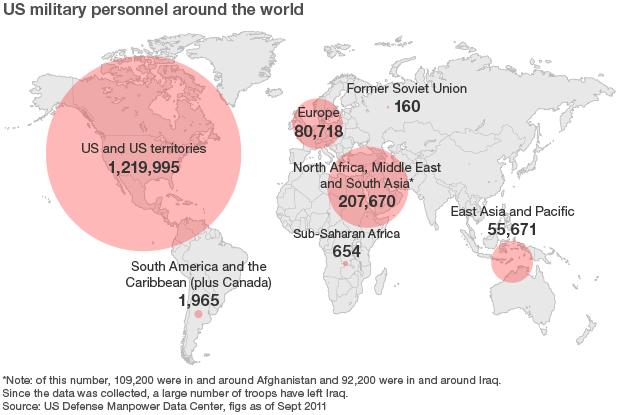US to cut almost 100,000 troops
- Published
US Secretary of Defense Leon Panetta said that the aim is to shape an "agile and flexible military force"
The US will cut almost 100,000 troops as part of its plans for a "smaller, leaner" military, Defence Secretary Leon Panetta has announced.
Unveiling a restructure of the armed forces, Mr Panetta said the US would boost special forces and retain the ability to defeat "any enemy on land".
The Pentagon is facing cuts of $487bn (£310bn) over the next 10 years.
In five years, the Army will drop from a peak of 570,000 to 490,000, and the marines be cut by 20,000, to 182,000.
The military's budget would rise, albeit at a slower rate, to $567bn by 2017.
Floating base
Mr Panetta said the US would continue buying F-35 jets, but would slow its purchase of the stealth fighter planes.
Focus would shift from large-scale conflicts in Iraq and Afghanistan to areas of key national interest, he said, including a strengthened commitment in Asia.
US special forces that were previously committed to Iraq will now be used around the globe, Mr Panetta said.
Such elite teams have become a key part of US strategy, killing Osama Bin Laden last year and rescuing hostages this week in Somalia.
Mr Panetta said there would be funding for a floating base that would serve special operations forces as well as drone units.
This would consist of a giant barge that can transport special operations or other forces at quick notice, reducing demands on aircraft carriers.
"Our approach was to use this as an opportunity to maintain the strongest military in the world, to not hollow out the force,'' Mr Panetta said in a statement.
Some members of Congress did not agree that such a budget would maintain a strong US military.
"Taking us back to a pre-9/11 military force structure places our country in grave danger," said Texas Senator John Cornyn, a member of a committee that will hold hearings on the budget plan.
Amid a shrinking budget - put at $525bn for the fiscal year 2013 - the US military as envisioned by the new plan would still be larger than it was before 9/11.
The defence budget could also lose another $500bn at the end of this year after Congress failed to agree on deficit reduction following a debt-ceiling deal in August.
'Technical edge'
Mr Panetta told reporters at a press briefing that the budget plan would give Congress the opportunity to act responsibly on reducing the deficit.
"This is a tough challenge, and nobody ought to underestimate just how difficult it will be," he said. "It's very easy to talk about deficit reduction, it's very tough to do something."
He stressed the need to retain a "decisive technical edge", citing increases in military technology including an expansion of the use of unmanned aerial vehicles.
In addition to the troop reductions, the Air Force will retire older cargo planes, while the Navy will keep their fleet of aircraft carriers but retire cruisers.
Submarine purchases will be delayed, including a two-year delay on building a new generation of ships designed to carry long-range nuclear missiles.
Mr Obama is expected to ask Congress in the near future to consider closure or combining additional US military bases, following a round of closures that began in 2005.
Republican hopefuls for president have pointed to the defence cuts as an argument against Mr Obama's re-election.
"We simply cannot continue to cut our Department of Defense budget if we are going to remain the hope of the Earth," Mitt Romney, the former governor of Massachusetts, said in a debate on 16 January.

- Published13 January 2012
- Published6 January 2012
- Published5 January 2012
- Published1 July 2011